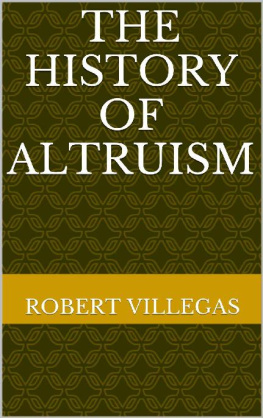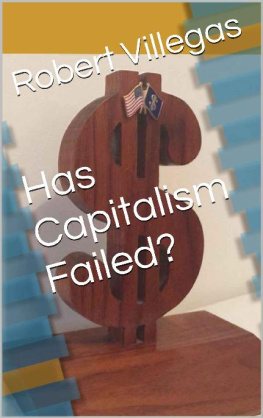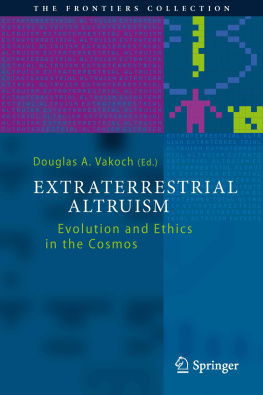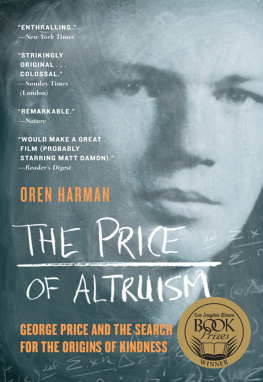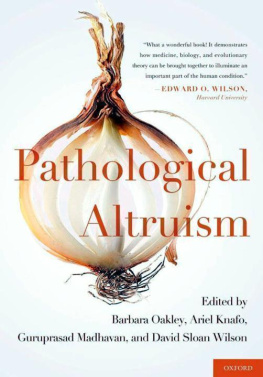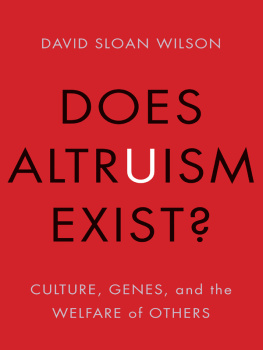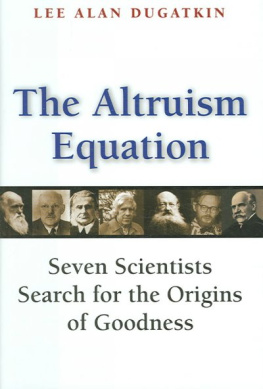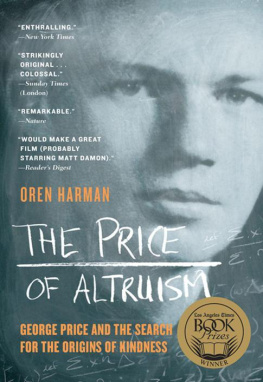Robert Villegas - The History of Altruism
Here you can read online Robert Villegas - The History of Altruism full text of the book (entire story) in english for free. Download pdf and epub, get meaning, cover and reviews about this ebook. year: 2016, publisher: Createspace Independent Publishing Platform, genre: History. Description of the work, (preface) as well as reviews are available. Best literature library LitArk.com created for fans of good reading and offers a wide selection of genres:
Romance novel
Science fiction
Adventure
Detective
Science
History
Home and family
Prose
Art
Politics
Computer
Non-fiction
Religion
Business
Children
Humor
Choose a favorite category and find really read worthwhile books. Enjoy immersion in the world of imagination, feel the emotions of the characters or learn something new for yourself, make an fascinating discovery.
- Book:The History of Altruism
- Author:
- Publisher:Createspace Independent Publishing Platform
- Genre:
- Year:2016
- Rating:4 / 5
- Favourites:Add to favourites
- Your mark:
- 80
- 1
- 2
- 3
- 4
- 5
The History of Altruism: summary, description and annotation
We offer to read an annotation, description, summary or preface (depends on what the author of the book "The History of Altruism" wrote himself). If you haven't found the necessary information about the book — write in the comments, we will try to find it.
The History of Altruism — read online for free the complete book (whole text) full work
Below is the text of the book, divided by pages. System saving the place of the last page read, allows you to conveniently read the book "The History of Altruism" online for free, without having to search again every time where you left off. Put a bookmark, and you can go to the page where you finished reading at any time.
Font size:
Interval:
Bookmark:
The History of Altruism
By
Robert Villegas
The History of Altruism
By
Robert Villegas
Copyright 2016 Robert Villegas
All Rights Reserved. No part of this book can be reproduced in any manner without written approval from the copyright holder or his legal representatives.
ISBN-13: 978-1530844135
ISBN-10: 1530844134
Library of Congress Control Number 2016938863
Published in the United States of America
Dedicated to
Living Life
Table of Contents
Introductory Comment
The author acknowledges that the term altruism (otherwise known as otherism) is a modern invention. The term did not exist during several of the eras discussed in this book. However, in view of the fact that altruism and human sacrifice are essentially the same concept (one is necessary for the other), he uses the terms interchangeably regardless of era.
Introduction
No man can become genuinely interested in things he has never seen and cannot imagine
The above quote is another way of saying you dont know what you dont know. I would add that you cant fight an enemy who is hiding in the shadows completely immune to your opposition.
Many people dont realize that their most deadly enemy has seldom been seen and cannot be imagined. In my view that enemy is altruism; and what is not imagined about it is that it is evil. If this is true, they are not aware of the principles that are destroying them. They are practicing a morality that brings only deadly results while they continue to expect things to get better; and even worse, they consider themselves to be moral while they are acting as their own destroyers.
Altruism and its precursor, human sacrifice, represent an institution that is still active in virtually every culture on the planet. When men emulate the gods, they engage in ritual human sacrifice which involves the giving up of values (including human life) for the sake of others. Over the centuries, human sacrifice became part of moral living as people sought to act in ways that pleased the gods, who, through their representatives, took human sacrifice and made it value sacrifice. The ritual was based upon the principle that man was owned by the collective and that the only moral act was for man to do as the collective demanded which means sacrificing his values (even his children) on the pyre in order to appease the gods.
Nigel Davies tells us:
The gods were squarely ranged on the side of those who found an occasional sacrifice necessary. The original members of the Greek pantheon treated each other with a brutality that makes the gods of Mexico seem by comparison soft-hearted. Like the Mexican Rain God, Tlaloc, and like Baal, they preferred little children as offerings. Greek religion derives from a primeval couple, Heaven (Uranos) and Earth (Gaia). Their children were collectively known as the Titans. One of these, Thetis, was wedded to Peleus, who was a mortal and could not, according to the rules, beget an immortal son. Thetis was determined to have a child that was immortal, seven children were born to her and one after the other she threw them into the fire or into a boiling cauldron. But at last Peleus put his foot down, and the infant Achilles was rescued from this fate. The tale of child victims continues with Chronos, the most powerful of the hideous breed of Titans. Uranos and Gaia warned him that he would be overthrown by his own children; he therefore swallowed them as fast as they were born. But when the youngest, Zeus, came into the world, he grew up and made war on his father and his fellow Titans; for ten years the battle raged, but at last the thunderbolts of Zeus triumphed. The Titans were then imprisoned in Tartarus, with the exception of Atlas, whose prodigious strength served for ever afterwards to hold up the sky.
As above, so below.
Human ritual, as we will learn, was engaged by traumatized men as they sought to understand and emulate the gods of their religions. How they were traumatized and why they decided to engage in periodic stage acting that amounted to mindless, soulless repetition of murder is thought by many to be a question for psychologists. However, I maintain that these questions can be answered, as well as many other questions, not only by science, but specifically by archaeology, anthropology, and other related sciences but also by epistemology, the branch of philosophy that helps man understand how he develops knowledge and justifies action.
Davies also tells us, In essence human sacrifice was an act of piety. Both sacrificer and victim knew that the act was required, to save the people from calamity and the cosmos from collapse. Piety connotes goodness and love of God, submission to and reverence for God and the sacred. If a person sacrifices out of piety then, it is assumed that the sacrifice is intended to accomplish some good and even, in some cases, the sacrifice, because it is tied to God, is considered intrinsically good.
Yes, terrorists kill piously. They consider their submission to their god to be good and if their god demands that they kill representatives of Satan, then their god will reward them in the afterlife. Tying piety to sacrifice, telling man that his sacrifice is an act of piety provides a strong ethical motive, one tied to the good and even to love of God and humanity. Yet, notice that even murderous terrorists today consider themselves to be pious. They are always thinking about God/Allah, they always praise him as they commit their crimes and they pray and worship throughout the day, even considering their self-destruction (acts of human sacrifice) to be acts of religious reverence.
This piety provides a clue to the power of the idea of murdering human beings for the sake of god. It is as if the evilest and deadliest actions can be undertaken by mindless brutes who portray themselves as peaceful and loving men. They must think that because their murderous acts are sanctioned by god, their piety removes them from responsibility for killing innocent people.
When an individual develops a thought pattern that enables murder, one learns that the most vicious and abysmal acts can be made into acts of love and concern for the future of mankind. When murdering people, over millennia, becomes taxing them or expropriating their wealth, the murder of innocents becomes the robbery of the productive for the sake of gods wishes.
Davies reminds us, Ritual and religion are inseparable from human sacrifice; indeed, we may define the term as killing with a spiritual or religious motivation, usually, but not exclusively, accompanied by ritual. Normally it was performed in a sacred place or one that had been made sacred for the occasion; in the absence of a temple or in primitive circumstances a magic ring drawn on the ground would serve.
As Euthyphro told Socrates, what is dear to the gods is pious, what is not is impious.
As I pondered these incongruities, I began to see that human sacrifice and altruism could only be considered moral if they were done at the behest of a God. There is no other reason to commit murder of this type (of others and of self) unless one had the powerful justification of something as fundamental as the demands of the gods. I realized that in order to challenge human sacrifice and altruism, one had to connect even the secular examples of human sacrifice (taxation and inflation) to the faith-based tenets of religion. There had to be a common denominator between religious sacrifice and secular sacrifice. As I advanced in my studies, I saw that the world of modern philosophy which spawned secular ethics, had scarcely challenged the basis of sacrifice and had merely rationalized it by turning the will of god into the will of society. This philosophical sleight of hand lifted human sacrifice whole from pre-history and delivered it unchallenged into the modern age.
Font size:
Interval:
Bookmark:
Similar books «The History of Altruism»
Look at similar books to The History of Altruism. We have selected literature similar in name and meaning in the hope of providing readers with more options to find new, interesting, not yet read works.
Discussion, reviews of the book The History of Altruism and just readers' own opinions. Leave your comments, write what you think about the work, its meaning or the main characters. Specify what exactly you liked and what you didn't like, and why you think so.

